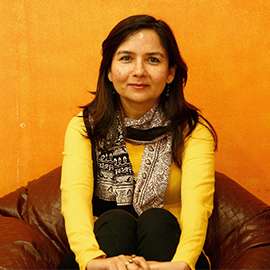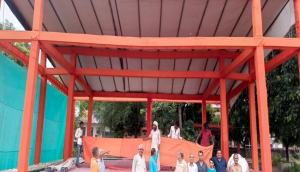Gopalkrishna Gandhi: Death penalty won't curb terrorism, ensure women's safety

When a man kills he breaks the law. When the state punishes by death it upholds the law.
This opening line from former civil servant and diplomat Gopalkrishna Gandhi's newest book Abolishing the Death Penalty: Why India Should Say No to Capital Punishment (Aleph Books) is rather inviting irrespective of which side of the fence you are sitting on or how much legalese you can digest.
Gandhi, who takes his famous surname from his paternal grandfather Mahatma Gandhi, even though he would rather not think or talk about it, throws one fundamental question after another - making a case for the abolition of the death penalty.
"You can't match crime with a crime, violence with violence. There has to be a slightly more elevated attitude to reasoning," he tells Catch.
He argues that there will not be a drop in terrorism or in crimes against women by awarding more death penalties.
"...I have been increasingly conscious of the criminal investigation system's attitude to the body and mind of the accused which reflects how the state regards the accused, which in my view is very backward and associated with medieval times."
Gandhi believes that along with working on the abolition of the death penalty the state also needs to reboot the investigative and prison systems.
Edited excerpts from the interview:
LH: What was Gandhiji's take on death penalty?
GG: Gandhiji saw it at two levels. One was the level of spiritual intelligence, in which he said that only the one who has the right to give life has the right to take it away, meaning God.
But at a more practical level, as a lawyer he was against death penalty because it is a penalty that cannot be reversed. There is no rectification possible. It is an irremediable, irretrievable and irreversible punishment.
Gandhiji was against it, so were quite a few other political thinkers, including Dr Ambedkar who said that the death penalty should go.
LH: What was Nehru's position on this?
GG: I have not come across Nehru's views on death penalty. But I do know that in the 1931 session of the Indian National Congress (INC) they passed a resolution against death penalty and Nehru was completely with the resolution. Sardar Patel was the President of the Congress then, and Pandit Nehru was very active in this...
So INC itself by resolution has opposed death penalty and in the Constituent Assembly there was a chance to abolish the penalty... If we now look back, I think it must have been because of Gandhiji's assassination. It was too big a trauma for them to abolish the death penalty.
I see it as an opportunity lost. I think it would have been a great thing in terms of India's political, philosophical and moral revolution - if at that occasion itself the Constituent Assembly had abolished the death penalty notwithstanding Gandhiji's assassination.

LH: When did you start thinking about the need to abolish the death penalty?
GG: I must say when I was in school and college I was pro death penalty. I didn't think about this very seriously as a student. It was a very shallow reasoning in school and college debates. I was also somewhat influenced by my maternal grandfather who was a lawyer and had a rather traditional and orthodox view on the death penalty.
I started thinking about it more recently by watching what has happened in Sri Lanka. Sri Lanka has abolished the death penalty, even though it has used violence and force against the Tamil Tigers with due proportionate retaliation...
But in the judicial state it has not hanged a single person since 1976. It is quite a record. Technically it is still on the statute and it is about to be removed, but effectively removed.
Bhutan has removed it. Small countries like that...
LH: Fiji as well...
GG: Yes. Can you imagine? So I have been influenced by the world trend towards death penalty.
LH: So you started thinking about it in the recent past?
GG: More than that I have been increasingly conscious of the criminal investigation system's attitude to the body and mind of the accused which reflects how the state regards the accused, which in my view is very backward and associated with medieval times.
Anybody who is an accused - death penalty is the ultimate extreme, it is not just about hanging it is about the whole culture of penology.
LH: If a person is not hanged, but jailed for life - isn't that just as bad because, as you are saying, the body is the property of the state, and the state may continue to torture...
GG: It can be very bad. That's an important point. That's exactly what I want to say - you can't say don't hang, but don't carry out any other reform.
Abolition of the death penalty has to be a part of the rebooting of the investigative and prison system in which the emphasis has to be on what is simplistically called reform.
Basically the emphasis has to be on what is perhaps immobilisation of the criminal impulse, physical immobilisation associated with a human approach to a person. Not match crime with a crime, not match violence with violence. That's a slightly more elevated attitude to reasoning reflected in some countries like Norway -- which is like an ideal. It is good to have ideals because then you can approximate...(chuckles)
In 2011, there was this bizarre incident where this lone wolf killed 72 people. Forget the fact that the state did not hang him, society too never demanded that. Some may have, but by and large the Norwegian society understood it for what it was.
I can also understand Pakistan bringing back capital punishment after the Peshawar incident. Like India, they had not implemented the death sentence for some time, but after Peshawar a large number of executions were carried out. Pakistan is now very high on where death penalty stands.
LH: But Pakistan also likes to blindly follow Saudi Arabia?
GG: Saudi Arabia, Iran, Pakistan, North Korea, China, India and the US are all at the top (of handing down death sentences) - but in the US one has to say that different states have different laws.
LH: The way our judicial system functions don't you think instant justice in some cases like the Nirbhaya incident works better?
GG: Abolition of death penalty and reforming the prison system is not being soft on crime. Norway is not my ideal, nor is Scandinavia. But countries in Europe and some African countries that have abolished death penalty are very hard on crime, I think that is what it should be. To immobilise the criminal and the criminal tendency does not require the state to become sadistic.
It is a very difficult proposition to beat up an accused, to extort a confession, which the state doesn't resist. And the state is not the President, the state is the constable...
That is how it is.
Crime is autonomous, punishment, in many ways, has autonomous segments to it, though finally it has to be what the judges say. But the process up to it is full of loopholes. Very often the hard work that is required in tracking a criminal is substituted by short-cuts, which are also notoriously misplaced...
It is also true, any visit to a jail will show you, that apart from the high-end (prisoners) former chief ministers and tycoons and Charles Sobhrajs (who live) in five star cells, the majority of prisoners are very poor people. First of all, majority of prisoners are undertrials, and a majority of the undertrials are found innocent and released. They come from very poor sections of society.
If you see the list of those who have been hanged they are from poor classes. What does that mean that the rich and the educated don't commit crimes? I don't believe that.

LH: So is our justice system skewed?
GG: This just shows that the justice system is very fallible. And I think the course of punishment should not be made short-hand for hard work.
LH: What do you think of Afzal Guru's hanging?
GG: I could only refer you to the Bachan Singh judgement - rarest of rare... 'Rarest of rare' is a remarkable landmark judgement which changed the whole course...from murder-is-equal-to-death, to murder-is-not-equal-to-death, to some-murders-do-not-require-death.
It is a landmark judgement, and it has opened the doors to interpretation. Finally the interpretation lands at the doorstep of the President who is not exercising judicial judgement, who is exercising a very subjective judgement.
LH: Is mercy then a political act?
GG: No, it is not a political act, but it is a presidential prerogative. A president has to see the situation in its totality, of course, guided by the advice of the government. He can't go against the advice of the government under the Constitution.
I am not saying this is the ideal situation, but this is how it is.
The President can't say hang a man if the government says don't hang him, or if the government says hang him, he can't say don't hang him. But he can engage with the government in the matter, he is after all not a wax doll. He or she is a thinking person.
Pratibha Patil did not accept a single recommendation for hanging...that was her way of doing it. APJ Abdul Kalam said 'yes' to hanging in one case.... that was his prerogative.
LH: What is the future?
GG: Death penalty will get abolished.
LH: How long before that happens?
GG: One can't say that. Because of terrorism it got hugely impeded. I can understand that. But the question that should be asked is - does hanging, does capital punishment stop terrorism?
Terrorist, by definition, is a person who is prepared to die for a cause...suicide bombings mean he is prepared to die. He wants shahadat. We are giving him what he wants. And we are not stopping or slowing down terror.
To which the counter can be 'how do you know how many terrorists have been discouraged because of the death penalty?' Semantically that question can be asked. But I know that no terrorist is afraid of death. He is a dealer in death, including his own.
LH: What about handing death to those who have committed grievous crimes against women?
GG: Have rapes come down after Nirbhaya? These people are on death row.
LH: Isn't 'rarest of rare' then quite ambiguous...
GG: It is a very fine thing. It has done a lot of good, it has brought down the number of hangings. The number of recommendations to the President has dropped steeply. It is a landmark judgement. It has to be still taken further.
I don't like the idea of the President - you can never know how the President will act, every President has a different approach, so can something as precious as life be left to the whimsy of one person?
Just like some judges are called 'hanging judges' and some judges are called 'pardoning judges' - I don't think that is right.
LH: In your book you quote Nelson Mandela as saying that killing is a reflection of the animal instinct in human beings. So the animal instinct is alive in us?
GG: It is alive. But I want to say that the voices for abolition of death penalty are also very strong.
LH: Maybe if they had been hanged right after the incident?
GG: I have this feeling...there is a great awareness among women. For instance, when I travel in the Delhi Metro I notice the kind of confidence women exude, and men are not ogling, maybe they are afraid of the cameras, and groping is out of question.
LH: The trouble is when women get in and out of the coaches, especially at overcrowded platforms...
GG: Even on platforms...(I don't see trouble).
LH: You have to be a woman to experience that...
GG: At Rajiv Chowk and Central Secretariat (stations) it was a crush. There was no latitude shown to women...
LH: So a hanging right after the Nirbhaya incident would not helped make Delhi a safer place for women?
GG: Awareness among women of their rights will help curb crimes, not death penalty.
LH: How does it feel to be Mahatma Gandhi's grandson?
GG: I don't think about it.
LH: Are people in awe of you?
GG: Happy to say - no (laughs).
LH: Does this relation disadvantage you in any manner?
GG: Let's not discuss this... (laughs)
First published: 1 December 2016, 4:31 IST






![BJP's Kapil Mishra recreates Shankar Mahadevan’s ‘Breathless’ song to highlight Delhi pollution [WATCH] BJP's Kapil Mishra recreates Shankar Mahadevan’s ‘Breathless’ song to highlight Delhi pollution [WATCH]](https://images.catchnews.com/upload/2022/11/03/kapil-mishra_240884_300x172.png)

![Anupam Kher shares pictures of his toned body on 67th birthday [MUST SEE] Anupam Kher shares pictures of his toned body on 67th birthday [MUST SEE]](https://images.catchnews.com/upload/2022/03/07/Anupam_kher_231145_300x172.jpg)






